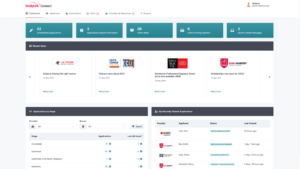New master agent models magnify the transparency gap

New technology platforms have transformed the way we do just about everything. It’s hard to imagine booking a holiday without first turning to an online platform to research all options, including advice from others through forums and reviews, before making any decisions.
But applying for overseas study is more complex than booking a trip. Making the wrong decision about course loads, costs or even language proficiency can have far-reaching consequences for the student, their family, and also for the education provider and their reputation in a global marketplace.
That’s why it’s so important to preserve the value an education agent provides, even as their model of delivery evolves.
The rise of online and self-service master agents
With increasing consumer expectations for 24/7 convenience and speedy service, it’s not surprising the international agent model has expanded to incorporate online-only master agents. Online counsellors can provide expert guidance and advice for individual students, without the need to visit an agent’s office.
However, if these platforms become little more than self-serve application portals, a vital step in the advice chain is lost – and there is greater potential for issues if GTE (genuine temporary entrant) assessments are not carried out properly, or visa applications are made without thorough candidate vetting.
These risks can also be exacerbated through the use of sub-agents, as the recent Association of Australian Education Representatives in India (AAERI) advisory discussed. Sub-agents are education agents who provide a master agent with applicants, but don’t have a direct contract with the institutions involved.
Under Australia’s ESOS (Education Services for Overseas Students) Act, in order for agents to represent Australian institutions they must have a formal agreement with the institutions they serve, including a listing on that institution’s website. Education providers spend time and money training their partner advisers to support the fulfilment of their agreements, ensuring a quality pipeline of future students. But that effort may be wasted if the principal agent is simply delegating all student recruitment tasks to a network of sub-agents.
While the practice of using sub-agents has been going on for some time as a lead generation tool, it’s concerning that institutions may have less visibility over who is recruiting, advising, vetting and guiding their incoming students. Particularly in light of the ESOS Act revision from October, which will require the details of the individual agent employee involved in each application to be entered into the Provider Registration and International Student Management System (PRISMS).
AAERI has advised its members that allowing sub-agents to apply to a provider, or apply for a visa on behalf of an applicant, could lead to future reputational damage. It recommends the principal agent takes responsibility for admissions and visas, and providers should also list ‘engaged sub-agents’ on their websites.
This seems reasonable, given the principal agent is accountable for compliance under their agreements. Masking their workflow without proper checks and balances is in no one’s best interest. However, the industry still needs greater confidence in the transparency of the process.
As demand for education grows, so will the risks of careless practices
With some forecasts suggesting global higher education enrolments are expected to grow by nearly 200% by 2040, new and scalable models will be needed to meet the continual increase in demand amongst international students. Students and their families will continue to make major (and expensive) decisions to study overseas – and there is an important role for quality, ethical agents to play in guiding them through their best options.
As a technology provider itself, StudyLink supports the application of technology to solve this challenge – as long as it is used to provide valuable advice and quality service in an ethical way, and continues to meet the agent’s obligations under institution agreements and regulatory changes.
These different agent models will also need to be subject to the same rules and performance metrics as traditional agents – such as enrolment benchmarks, and visa rejection and degree transfer rates.
To do this, the industry will need a more consistent and visible process for capturing and sharing agent data, ensuring the complete transparency that agents, providers and government agencies need. StudyLink is well-positioned to help with this, as our focus is on ensuring everyone has the ability to access the right information to make more informed decisions at every step of the process.
Learn how StudyLink Connect can convert more quality applications to your institution, submit an enquiry to talk to our Sales team.



